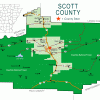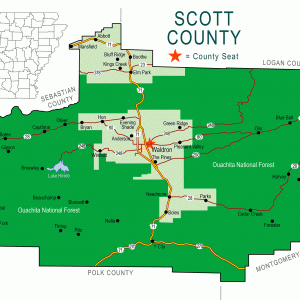calsfoundation@cals.org
Winfield (Scott County) [Northeast]
The Winfield community located northeast of Waldron (Scott County) is a historical town in central Scott County. Very little structural evidence of the town remains. Agriculture was likely important in the area, which was settled in the late 1830s. For a time, Winfield also served as the county seat. It is one of two communities to bear that name in Scott County.
The area’s first inhabitants included natives from the Archaic, Woodland, and Mississippian periods. Archaeological discoveries have provided evidence that suggest natives of the Caddo tribe made their homes along the East Fork of the Poteau River and other prominent waterways in the area.
Throughout the late seventeenth and early eighteenth centuries, French trappers and traders traveling west from the Arkansas Post likely traversed the Poteau River and other prominent bodies of water in the area. White settlers began arriving in the area near Winfield as early as the late 1830s. The area continued to be settled from the 1840s to the 1850s. Most families participated in a wide variety of agricultural practices.
By 1840, residents of Scott County requested that the county seat be moved closer to the center of the county. Commissioners Robert Cauthron, Joseph Tomlinson, and William Fleming voted to move the county seat from present-day Logan County to an area about one and a half to two miles northeast of Waldron. The community became known as Winfield. The change was officially approved on January 5, 1843.
The post office in the area had been known as Poteau Valley and had been established in 1838, with William G. Featherston as the first and only postmaster. The post office was moved and its name changed in 1843 in order to serve the community of Winfield. Edward Featherston, William’s brother, was the first postmaster at the newly established Winfield post office.
Edward Featherston was one of the best-known residents of Winfield. He was interested in building a large town at Winfield and selling real estate. William Featherston was also involved in real estate and offered ten acres of land to the county in order to convince leaders to move the county seat to Waldron. The offer was accepted, and the county seat moved to Waldron in 1845. The post office at Winfield was closed in 1846 and changed to Waldron.
A log courthouse was erected in Winfield and would be the county’s second courthouse to be constructed. The town was located on what was later known as the York Farm. There were only four dwellings there by 1840. The courthouse was also used as the post office and saloon. There is an old cemetery near the community, known as Turman Cemetery, that is believed to have been established by the residents of Winfield.
According to some sources, a Native American man named Joe and a black man reportedly murdered members of the Cox family. The pair confessed to their crime and were sentenced to death. The black man was chained and burned to death, while the Indian man was hanged—reportedly the only known hanging by civil authorities in the county. The man was hanged from a cedar tree near the courthouse, and his grave is supposedly located near where the courthouse stood.
Winfield never fully developed into a thriving town, although people continued to settle in the area northeast of Waldron. Agriculture continues to be an important way of life in the area, mostly in the form of cattle and chicken farms.
For additional information:
Biographical and Historical Memoirs of Western Arkansas. Chicago: Goodspeed Publishing Company, 1891.
Cate, Michael. History of Scott County, Arkansas. Dallas: Curtis Media Corporation, 1991.
Goodner, Norman. A History of Scott County, Arkansas. Siloam Springs, AR: Bar D Press, 1941.
McCutcheon, Henry Grady. History of Scott County, Arkansas. Little Rock: H. G. Pugh and Company, 1922.
Ty Richardson
Richardson Preservation Consulting







Comments
No comments on this entry yet.